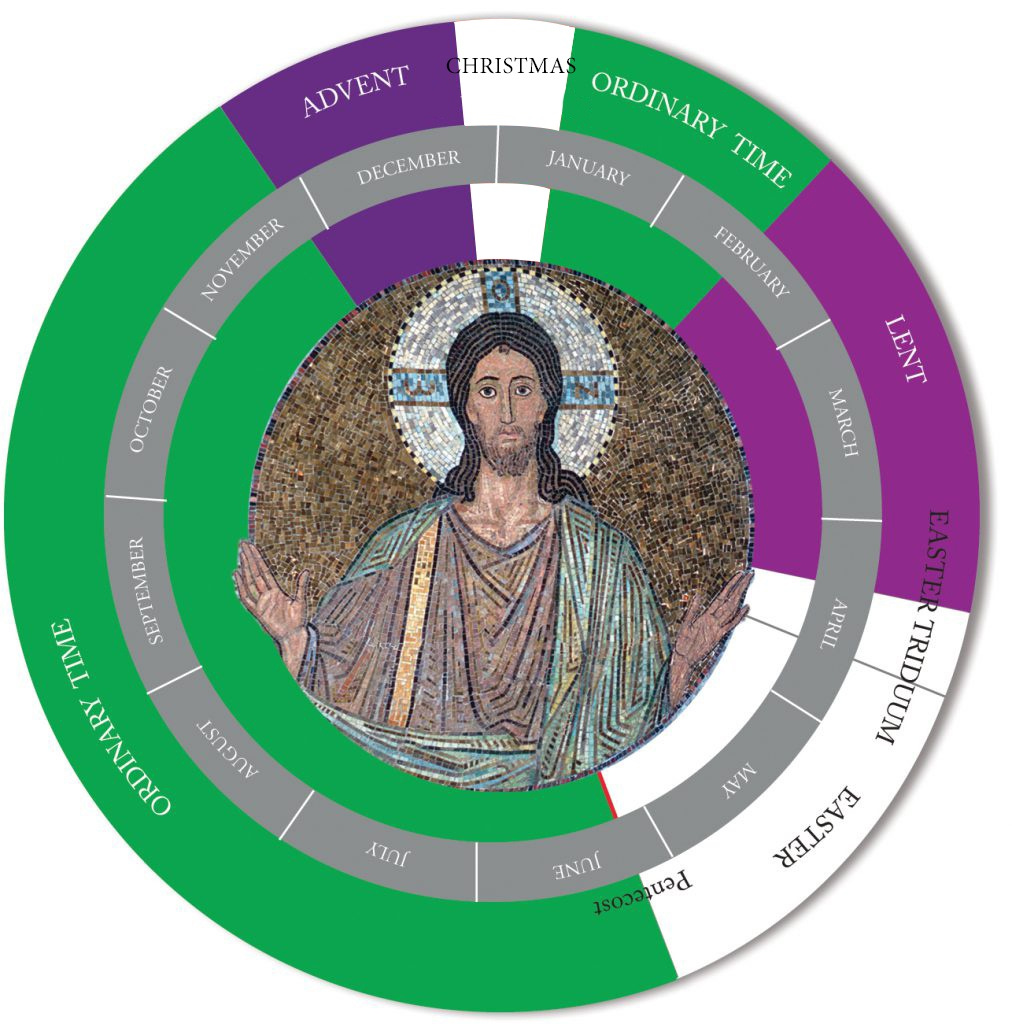Today, I thought I’d share with you a message I gave at Ashland Theological Seminary’s chapel yesterday—I say “message” because “preaching” sounds so much harsher and lofty than I actually am, but also that’s what I was doing, and I should just get over it already. This is the full transcript of what I read (also, it’s basically impossible for me to speak off the cuff and sound even the teensy bit smart, so yes, I read my message… I mean sermon… whatever…).
Thanks for being here—blessings on your palace in time!
(This bit is longer than my normal bits, so thanks for sticking around as long as your attention span will allow it.)

I have many different ties to Ashland—two-time alum, former administrator and current casual employee, mother of a current student, wife of a current employee—all of which makes me a very Enthusiastic Eagle. Today I’m here, I think, because it is the beginning of the first chunk of Ordinary Time in the liturgical calendar, and last year, my book of essays, Ordinary Time: Meditations from the In-Between was published. So I’m excited to talk to you all about Ordinary Time. But first, let’s begin with a word of prayer and invite our hearts and minds into the presence of God.
Lord, thank you for each person in this space today. We were each once lost, but in your good grace and extravagant love, now we are found. I pray that this time together would be one in which we can soak in your presence. Thank you for being with us, Lord, in all the moments of our days. Please bless this message and make the words I say pleasing to you and all who hear them. Amen.
I’d like to begin today in the gospel of Luke 15:1-10. I’ll be reading the Message paraphrase:
“By this time a lot of men and women of questionable reputation were hanging around Jesus, listening intently. The Pharisees and religion scholars were not pleased, not at all pleased.
They growled, “He takes in sinners and eats meals with them, treating them like old friends.”
Their grumbling triggered this story.
“Suppose one of you had a hundred sheep and lost one. Wouldn’t you leave the ninety-nine in the wilderness and go after the lost one until you found it? When found, you can be sure you would put it across your shoulders, rejoicing, and when you got home call in your friends and neighbors, saying, ‘Celebrate with me! I’ve found my lost sheep!’ Count on it—there’s more joy in heaven over one sinner’s rescued life than over ninety-nine good people in no need of rescue.
“Or imagine a woman who has ten coins and loses one. Won’t she light a lamp and scour the house, looking in every nook and cranny until she finds it? And when she finds it you can be sure she’ll call her friends and neighbors: ‘Celebrate with me! I found my lost coin!’ Count on it—that’s the kind of party God’s angels throw every time one lost soul turns to God.””
The other day, my parents woke up in the middle of the night. These days, the worries and anxieties of the daytime refuse to leave them alone when they finally succumb to sleep, so at 2 or 3 in the morning, my dad wakes up. He might wander outside if the night is fine, stare up at the stars, and pray, or he might do what he did last week.
My dad isn’t quiet when he wakes up in the middle of the night—he grumbles and moans and roars out a yawn, then throws back the blankets. My mom is not a deep sleeper, either, so after he left the room, she came down to see what my dad was up to.
He was doing what you’d imagine you would need to do at 2 in the morning, throwing a few logs into the fireplace, far, far away from their bedroom. My mom told him she couldn’t stay up with him, so she headed back upstairs.
Just as my mom closed her eyes, my dad threw open their bedroom door and shouted, “Where are the fire extinguishers?!”
“Why?!” She yelled, awake and alert and certain my dad had caught the living room on fire. “Is there a problem?”
“No,” he said, “but we should have fire extinguishers somewhere, and I can’t find them.” Now, as you know, there are fires blazing in communities out west. Entire communities and lives have been ravaged by flames. At 2 in the morning, every fear and anxiety from the daytime is heightened, perhaps even over-exaggerated.
“There’s one right next to the fireplace,” she said. “And one under the sink, and another one in the laundry room.”
“They’re not there,” he said.
“Yes they are,” my mom insisted.
“No they aren’t,” he replied.
So my mom threw back the blankets again and followed him downstairs.
“There,” she said, pointing at the bright red, 18-inch cylinder sitting right next to the fireplace. “And here’s the one under the sink,” she said, “and here’s the one in the laundry room.”

In my house, too, I am the finder of lost things.
I think it’s somehow coded into a mother’s DNA, or perhaps it’s uniquely wired into every female set of X chromosomes. A friend of mine calls this ability to see things her husband can’t her “woman eyes,” as in, “Let me come over there and find it with my woman eyes,” like we have superpower, x-ray, finding-things sight.
God knew that someone in the household would need some keen vision and remarkable memory for where lost things are found.
It’s hard to take the time to find what is lost when you’re in panic mode. All you have time for is survival. This truly is hard-wired into our systems. When we’re under threat, our bodies will only listen to our limbic system, what’s known as the “lizard brain,” which is in charge of doing whatever it takes so that we won’t die. If running is required, we take flight. If freezing is required, we freeze. If fighting is required, we fight.
No one has time or the presence of mind to find the one lost coin when they’re in fight-or-flight mode. Our bodies and brains and hearts only have space for what’s right in front of us—survival.
At Park Street Brethren Church the last several years, we’ve been pinning our location in time according to the liturgical calendar, following through the various seasons. As you know, we recently wrapped up the longing and waiting of Advent to move into the celebration of Christmas. This week begins a brief wedge of Ordinary Time, and then we’ll suffer through Lent, before ushering in Easter, and then we’ll be back into a long stretch of Ordinary Time.
We spend a lot of time and energy preparing for the bookends of birth (Christmas) and death (Easter) in the life of Jesus. Many a Nativity is now stashed in church closets with boxes upon boxes of garlands and lights, waiting for the next Advent. Every empty sanctuary now awaits the placement of palms, anticipating the triumphant King’s arrival. The whole church staff rallies around these momentous holidays, and rightly so—we want to usher in the coming King! We need to remember the suffering, death, and resurrection of our Lord!
But then it’s all over—the special cakes and special dinners and special services end, and Ordinary Time begins. Ordinary Time takes up 33 weeks of the calendar year. That’s nearly two-thirds of every year. What on Earth are we supposed to do with all of that time?
Our own lives mirror the liturgical calendar. We all have our seasons of Advent, when we’re awaiting the Big Day. Graduations, weddings, the births of children, career changes, and retirement are all preceded by a season of Advent. All of our attention is focused on ushering in the New Thing the Lord has for us, and the New Thing requires our full attention. Advents might be filled with delightful longing, but that joy and anticipation doesn’t negate the season’s challenges. Advent—waiting, hoping, longing, and preparing—is hard work. It takes all of our attention.
There’s no time in our Advent seasons to find lost coins.
We also all have our seasons of Lent. If Advent is difficult, just wait until you’ve walked through a few Lents. Lent is the season of suffering inevitable temptations and losses. It’s the season we’re reminded that no New Thing ever lasts, even our own lives—which were once the New Thing on the scene—come to an end, and in many ways, these Lenten seasons shape and prepare us for that inevitable end. If you’ve miscarried, lost a parent, lost a child, lost a job, gotten divorced, dealt with a chronic illness, trudged along under the blanket of depression, or any other number of sorrows and difficulties that are woven into the fabric of reality, you’ve walked through your own Lenten seasons.
There’s no time in our Lenten seasons to go looking for one lost sheep.
Lent also prepares us for Holy Week, that beautiful and terrible and miraculous week of final suffering, death, and ultimately resurrection. Holy Week is special and terrifying. Most of us only go through one Holy Week in our lifetimes, but we all know people who have entered Holy Week. They are those with terminal illnesses. Those in hospice care. Those who feel like they’re at the end of their ropes. Those who weren’t able to flee the California fires.
In the midst of our Advents and Christmases, our Lents and Easters, no one has time to go hunting for lost coins and lost sheep.
But what about Ordinary Time?
In many ways, our seasons of Ordinary Time feel like moments we need to just “get through” in order to reach the next landmark. Society is wired this way. We climb the corporate ladder. We set goals. We make resolutions. We join new challenges. We draft strategic plans and set 10-year visions for what we will achieve and how we will grow and what New Thing we will build. The second Christmas is over, stores are stocking their shelves for Valentine’s Day. Just this week, I passed an aisle filled with leprechauns and four-leaf clovers, and it’s only January 16!
But all of this extra time between holidays and anniversaries, when we’re just mucking about making coffee and folding laundry, what is it all for except to get us on to the next New Thing? I don’t know about you, but I don’t want to spend two-thirds of my life just getting by, going through the motions until the next baby is born or the next bout of suffering hits.
There’s no time to find the lost coin or the lost sheep when the house is burning down, but there’s all the time in the world to find the lost coin and pursue that one grumpy sheep during Ordinary Time.
In addition to finding lost fire extinguishers, my mom is constantly finding dimes around her house. Dimes appear in her cup holder in the car. A dime will be the sole coin at the bottom of her laundry basket after she’s done folding clothes. Dimes land on her dresser and in her drawers and at the bottom of shoeboxes in her closet. She’s convinced that my grandfather—dead for nearly 18 years—has been depositing them ever since he died to remind her of his love and protection.
When my mom was going through cancer treatments at the hospital, she had no space for finding dimes. In the middle of her Lenten season of suffering, she had to trust that love held her, without the signs, without the lost and found of dimes.
We spend more than half of our lives in these seasons of Ordinary Time, times when nothing much is happening—at least that’s how it seems. But here is where the treasure is. God has hidden a treasure in a field of ordinary time. Ordinary time hides the incarnate Christ in plain sight and then invites us on a treasure hunt.
All of the space granted by ordinary time gives us room to grow. Ordinary time is the long pocket of time given to us for rest, for preparation, and for joy. There is so much to find here in ordinary time, so much to cherish, so much to learn.
It is—or it can be—a kind of constant Sabbath, the kind Hebrew scholar Abraham Joshua Heschel described as “a palace in time with a kingdom for all.” If we allow ourselves to pause in the midst of all the mundane duties of this age, we might find that God has sprinkled evidence of his presence in every single thing—even the laundry. He’s in all the obvious places, too—Christmas, Easter, Good Friday—but once we start looking, we’ll discover that the flavor of Christ is here, there, and everywhere, infused in creation’s every particle. You’ve heard of micro-dosing? This meditative pausing and noticing the world God made around you could be called micro-Sabbathing, an intentional stop that can happen throughout the day as a way to practice the presence of God.
And once we’re practicing the presence of God, Ordinary Time opens our eyes to the wonders of our existence, the love of God poured out for us, our connection to creation, and our need for each other. Ordinary Time is the season we get to open the doors to the kingdom of heaven, locate that lost coin so we can buy a little more dinner, and invite in the lost sheep and lost son and his do-gooder brother, just like the extravagant Father did, and does.
Ordinary Time is the season when we’re granted the space to look for the pearl of great price in our lives. It’s the time when we’re initiated into the treasure hunt of meaning and purpose and calling, the thing that we’d give up everything to possess.
Ordinary Time is the kingdom of lost and found, the kingdom of the sons and daughters of the living God living out the mission of the church, looking for and finding all that God has called precious and beautiful and good, and telling them just how precious and beautiful and good God has made them, how much God loves them, how every act of service and word of encouragement is a seed of that same love.
In the middle of our boring, mundane, ordinary lives, when no one is being born and no one is dying, when all there is to do is dishes and laundry, use your Spirit vision—your woman eyes—to see Christ tangled in the clean sheets, to find the Spirit of God in the dishes that held the meal you prepared so that the people in your life might have sustenance. Taste and see—in every cup of coffee, in every pair of matched socks—that the Lord is good.

If we do not allow ourselves the space for Ordinary Time, we will spin from miracle to tragedy and back again in a constant frenzy, with no time to reflect, only time to react. Without Ordinary Time, fear and anxiety take the place of love and peace in our hearts. With them at the helm, the lizard brain never rests. The lizard brain only has time and energy for its own survival. The lizard brain becomes blind to the fire extinguishers in our lives and forgets that all things are held together by Christ, all things.
Without the space of Ordinary Time, we have no eyes to see or ears to hear the lost sheep bleating on the street corner, in the classroom, in the back pew, in our own homes.

This is why Ordinary Time is a gift. When Jesus wasn’t being born miraculously, suffering through forty days in the wilderness, dying on a cross, and rising from the dead, He ate and slept. He prayed and learned. He worked alongside others. He rested. Between the seasons of great distress and blessing, Jesus had ordinary time to live out the love of God he came to show the world. Between our own seasons of distress and blessing, we have ordinary time for that same work as well, right in the midst of our ordinary lives.
Ordinary time is where lost things are found. May every single one of your ordinary, mundane days be filled with a treasure hunt in the kingdom of heaven.
Let’s pray.
Lord, thank you for ordinary time. Thank you for inviting us in to your rest and your care, for giving us the benevolent commandment to rest, for giving us seasons of rest in between seasons of distress. Forgive us, Lord, for the ways we have sought to fill our own needs by our own ways. Forgive us for our failure to make time and space to find the lost coin, to seek the lost sheep, and to celebrate the return of the lost son. Help us to make the space, in the middle of our ordinary lives, to experience the extraordinary fruits of your Spirit, which are love, joy, peace, patience, kindness, goodness, faithfulness, gentleness, and self-control. Help us, through the good work that you have given us to do, to love each other well, abundantly, and thereby live abundant lives. Your ways are pleasant ways, and all your paths lead to peace. In your joyful, wise, and precious name we pray, Amen.

















Share this post